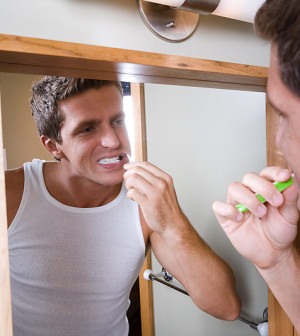- Could Your Grocery Store Meat Be Causing Recurring UTIs?
- Are You Making This Expensive Thermostat Error This Winter?
- Recognizing the Signs of Hypothyroidism
- 10 Strategies to Overcome Insomnia
- Could Artificial Sweeteners Be Aging the Brain Faster?
- Techniques for Soothing Your Nervous System
- Does the Water in Your House Smell Funny? Here’s Why
- Can a Daily Dose of Apple Cider Vinegar Actually Aid Weight Loss?
- 6 Health Beverages That Can Actually Spike Your Blood Sugar
- Treatment Options for Social Anxiety Disorder
Caring for Baby’s Teeth Starts Before Birth

A child’s dental health begins at the time of conception, says an expert who recommends mothers-to-be visit the dentist before, during and after pregnancy.
“The mother’s dental health affects her overall health and her baby’s health. Statistically, mothers with poor oral health are at risk for premature and underweight births,” William Wathen, an associate professor at Texas A&M University Baylor College of Dentistry, said in a university news release.
“Mothers-to-be need to realize controlling plaque and limiting high-starch and sugary foods is crucial,” Wathen added. “Cavities are ‘contagious,’ because germs in the mother’s mouth and family’s mouth will be in a baby’s mouth. Since babies aren’t born with their own oral flora, they adapt it soon after they’re born from their family.”
Here he offers a timeline of when and how to keep youngsters’ teeth and gums healthy.
Soon after birth, parents should massage their baby’s gums with their little finger, a small, soft cloth or a rubber fingertip toothbrush. This gets babies used to having objects in their mouth other than the nipple.
“If parents are consistent with this action, it will prevent most fussing and fretting when the infant is eventually taken to the dentist. You should do this a few times a day for no more than two or three seconds,” Wathen said.
When the baby’s first teeth appear, usually around 6 months of age, use a soft cloth to remove plaque from their surfaces at least twice a day, especially before and after feedings and before bedtime.
“Parents should never put sugary liquids in their baby’s bottle and let them go to sleep. This will guarantee tooth loss,” Wathen said.
Eventually, parents can start cleaning their child’s baby teeth with a soft toothbrush with a small head and large handle.
“At first, just wet the toothbrush and massage their teeth gently,” Wathen advised. “Infant toothpastes are safe to use, but you shouldn’t use fluoridated toothpaste until your child is old enough to spit it out — normally around 3 to 4 years of age.”
Parents should brush their children’s teeth until youngsters are old enough to do it themselves, at around 7 or 8 years old, he said.
A baby’s first visit to the dentist should occur between ages 6 months and 1 year, followed by dental checkups every six months, he noted.
“It’s important for both dental health experts and parents to work together to instill good dental habits in children. Kids do what their parents do, and you should always let your child be part of your own effective oral health routine,” Wathen said.
More information
The American Academy of Family Physicians has more on child dental health.
Source: HealthDay
Copyright © 2026 HealthDay. All rights reserved.










